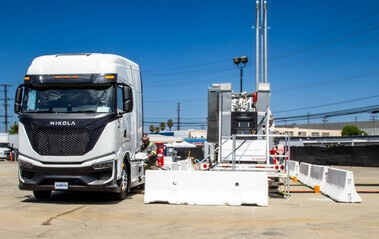The hydrogen fueling station market is projected to be worth $454.1 million in 2024 and is expected to expand at a compound annual growth rate (CAGR) of 17.5% throughout the forecast period, according to a report from Future Market Insights (FMI).
By 2034, the market is anticipated to grow to $2.3 billion. This growth is largely driven by the rising adoption of hydrogen-powered vehicles, which is increasing the demand for more hydrogen fueling stations.
Global hydrogen fueling station growth is driven by a combination of market trends, technological advancements and governmental policies aimed at reducing carbon emissions and fostering the adoption of hydrogen as a clean fuel alternative.
The hydrogen fueling station market has been evolving rapidly, driven by the growing adoption of hydrogen fuel cell vehicles and increased investment in hydrogen infrastructure. As nations worldwide strive to meet their carbon neutrality goals, hydrogen fuel is emerging as a viable solution for reducing greenhouse gas emissions. This shift is supported by advancements in hydrogen production, storage and distribution technologies that are making hydrogen fueling stations more accessible and cost-effective.
Several key factors are propelling the hydrogen fueling station market forward:
- Government policies and incentives — Governments globally are implementing policies and offering incentives to promote the use of hydrogen as a clean energy source. These initiatives include subsidies for hydrogen fueling infrastructure, tax benefits, and support for research and development in hydrogen technology.
- Technological advancements — Innovations in hydrogen production, storage and dispensing technologies are driving down costs and improving the efficiency of hydrogen fueling stations. Advances in electrolyzer technology and compression methods are making hydrogen fueling stations more feasible and economical.
- Growing environmental awareness — As concerns about climate change and air pollution increase, demand is growing for alternative fuels that offer a cleaner and more sustainable option. Hydrogen fuel cells produce zero emissions at the point of use, making them an attractive choice for environmentally conscious consumers and businesses.
- Expansion of hydrogen infrastructure —The development of a comprehensive hydrogen fueling network is crucial for the widespread adoption of hydrogen fuel cell vehicles. Investments in building new fueling stations and upgrading existing infrastructure are supporting market growth.
“The rapid expansion of the hydrogen fueling station market, projected to grow at a 17.5% CAGR by 2034, is a clear indicator of the global shift toward hydrogen as a clean energy solution, driven by the increasing adoption of hydrogen-powered vehicles and supportive governmental policies,” says Nikhil Kaitwade, associate vice president at FMI.
The hydrogen fueling station market is highly competitive, with key players actively investing in research, development and strategic partnerships to gain a competitive edge. Major companies in the market include:
- Air Liquide
- Air Products and Chemicals Inc.
- Linde PLC
- Nel ASA
- McPhy Energy S.A.
- Ingersoll Rand
- Hydrogen Refueling Solutions
- PERIC Hydrogen Technologies Co.
- Chart Industries Ltd.
- Iwatani Corporation
- Powertech Labs Inc.
- PDC Machine
- Sera GmbH
These companies are focusing on enhancing their technological capabilities, expanding their global footprint, and forging collaborations with automotive manufacturers and governments to drive market growth.






